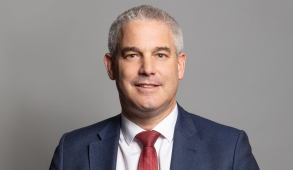Pay deal to be implemented following NHS Staff Council vote
The staff council approved the pay deal covering 2022/23 and 2023/24, with a majority of the unions representing agenda for change staff voting to accept the offer. However, four unions including the Royal College of Nursing and Unite, remain in dispute with the government over the deal with the continued threat of further strike action.
The pay offer includes two non-consolidated payments for 2022/23, including a lump sum worth 2% of salary and backlog bonus ranging from 1.5% to 6.2%. Together the one-off payments will add between £1,655 and £3,789 and are on top of the £1,400 consolidated payment already awarded in year. In addition, staff will receive a 5% increase for 2023/24.
Health and social care secretary Steve Barclay (pictured) said the vote by the staff council demonstrated ‘that a majority of NHS staff agree this is a fair and reasonable deal’. He said the deal would now be implemented for all agenda for change staff, and he hoped members of unions remaining in dispute would now decide to bring industrial action to an end.
Matthew Taylor, chief executive of the NHS Confederation welcomed the council’s vote but said that, with four unions still in dispute, ‘the worrying prospect of further industrial action remains’. He also highlighted the continuing pay dispute involving junior doctors with the last strikes leading to the postponement of 196,000 appointments and planned procedures.
NHS Providers chief executive Julian Hartley also warned that the NHS was ‘not out of the woods yet’. Despite the welcome decision by the staff council, he also underlined that the vote was not unanimous, which reflected the ‘strength of feeling among NHS staff.
‘We understand why NHS staff reached a tipping point amid a cost-of-living crisis and severe staff shortages, which mean ever-increasing workloads,’ he said. ‘We hope this breakthrough signals an opportunity for the government and unions to ‘reset’ their relationship and to resolve wider, ongoing issues affecting the NHS and its people. The government must act to tackle fundamental problems including understaffing and burnout.’
Both the representative bodies also called for reassurances that the pay deal would be fully funded with new money, rather than using existing NHS budgets. March’s budget only allowed for a 3.5% pay rise in 2023/24 – not the 5% in the final deal.
NHS England has told integrated care systems to plan on the basis that the pay award would be fully funded on top of the allocations already awarded. But the health secretary has also said that, while frontline services would be protected, the pay deal would be funded from a combination of ‘additional funding and reprioritising existing budgets’. This raises the concern that important central health budgets could be reduced to meet some of the additional pay costs.
‘The government promised previously that there will be no impact on frontline services or to the quality of care as a result of the offer, which must be reflected in the additional funding that now emerges,’ said Mr Taylor. Sir Julian echoed this, calling for ‘a firm commitment’ to fully funding the deal. He added that the promised long-term workforce plan must also be ‘fully costed and fully funded’ to tackle chronic staff shortages.Related content
The Institute’s annual costing conference provides the NHS with the latest developments and guidance in NHS costing.
The value masterclass shares examples of organisations and systems that have pursued a value-driven approach and the results they have achieved.